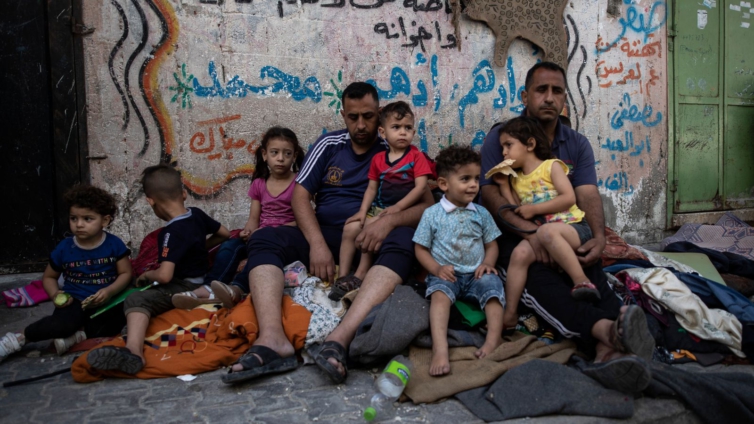Sustained Israeli military airstrikes have destroyed nine miles (14km) of militant tunnels along the Gaza Strip, and the homes of nine Hamas commanders, the Israeli military says.
According to the Israeli Defense Forces, the latest attacks killed a local Gaza leader of the Islamic Jihad militant group, blamed for some of the thousands of rocket attacks launched at Israel.
It said it struck 35 "terror targets" as well as the tunnels, which it says are part of an elaborate system referred to as the "Metro", used by fighters to elude aircraft.
Residents of Gaza who were awakened by the overnight barrage described it as the heaviest since the conflict escalated a week ago - and even more powerful than a wave of airstrikes in Gaza City the day before that killed 42 Palestinians and flattened three buildings.
There is no confirmation yet on the number of casualties from the latest strikes.

The majority of the fatalities so far have been reported in Gaza with at least 200 Palestinians killed, including 59 children and 35 women, with 1,300 people wounded.
Eight people in Israel have been killed in rocket attacks launched from Gaza, including a five-year-old boy and a soldier.
The latest developments come after a three-storey building in Gaza City was heavily damaged, but residents said the military warned them 10 minutes before impact and everyone was able to flee.
The building housing the Associated Press's Gaza office and those of other media outlets was also hit.
AP president and chief executive Gary Pruitt said he was "shocked and horrified" that it had been targeted.
He said the AP had "no indication Hamas was in the building or active in the building".
But the Israeli Air Force maintained the bombings had targeted nine residences belonging to "high-ranking commanders" of the Hamas organisation.
"The residences that were struck were used as terror infrastructure. Some of the residences were used to store weapons," it said.
Despite growing international calls for a de-escalation of violence, US secretary of state Antony Blinken signalled on Monday the US would not join growing calls for an immediate ceasefire.
"Ultimately it is up to the parties to make clear that they want to pursue a ceasefire," he said, something Israeli Prime Minister Benjamin Netanyahu has made clear will not happen.
Attacks, he said, would continue at "full force" and would "take time".
Gaza's mayor Yahya Sarraj told Al-Jazeera TV the intensive barrage had caused severe damage to roads and other infrastructure.
"If the aggression continues, we expect conditions to become worse," he said.

The UN has warned Gaza's sole power station is at risk of running out of fuel. The territory already experiences daily power outages of eight to 12 hours, and tap water is undrinkable.
The conflict escalated last Monday after Hamas fired long-range rockets at Jerusalem following weeks of clashes in the Holy City between Palestinian protesters and Israeli police.
The protests were focused on the heavy-handed policing of a flashpoint holy site during the Muslim holy month of Ramadan and the threatened eviction of dozens of Palestinian families by Jewish settlers.
Since then, the Israeli military has launched hundreds of airstrikes that it says are targeting Hamas's militant infrastructure.
Militants in Gaza have fired more than 3,100 rockets into Israel.
"I have not seen this level of destruction through my 14 years of work," said Samir al Khatib, an emergency rescue official in Gaza. "Not even in the 2014 war."
Hamas and the Islamic Jihad militant group say at least 20 of their fighters have been killed, while Israel says the number is much higher and has released the names and photos of more than two dozen militant commanders it says were "eliminated".
Meanwhile thousands of Yemenis have taken to the streets in the rebel-held capital, Sanaa to denounce Israeli attacks on Gaza.
Protesters carried Palestinian flags and banners calling for the boycott of Israeli and American goods.
They also chanted: "Death to America!" and "Death to Israel!"
Many protesters were seen carrying AK-47 assault rifles.
The protests are called by Houthi rebels, who are allied with Hamas. Both groups have close ties with Iran, the archenemy of Israel.
Latest Stories
-
Ghanaians to enjoy reliable electricity this Christmas – ECG promises
2 minutes -
Police deny reports of election-related violence in Nsawam Adoagyiri
5 minutes -
‘We’re not brothers; we’ll show you where power lies’ – Dafeamekpor to Afenyo-Markin
9 minutes -
EPA says lead-based paints are dangerous to health, calls for safer alternatives
2 hours -
Queenmother calls on President-elect Mahama to appoint more women in his government
4 hours -
Atletico Madrid beat Barcelona to go top of La Liga
4 hours -
Usyk breaks Fury’s heart with points win in rematch
4 hours -
Ghana-Russia Centre to run Russian language courses in Ghana
10 hours -
The Hidden Costs of Hunger: How food insecurity undermines mental and physical health in the U.S.
10 hours -
18plus4NDC marks 3rd anniversary with victory celebration in Accra
13 hours -
CREMA workshop highlights collaborative efforts to sustain Akata Lagoon
13 hours -
2024/25 Ghana League: Heart of Lions remain top with win over Basake Holy Stars
14 hours -
Black Queens: Nora Hauptle shares cryptic WAFCON preparation message amid future uncertainty
15 hours -
Re-declaration of parliamentary results affront to our democracy – Joyce Bawah
15 hours -
GPL 2024/25: Vision FC score late to deny Young Apostles third home win
15 hours

